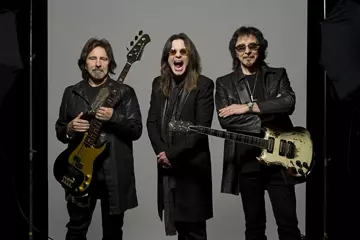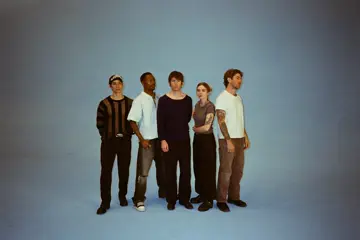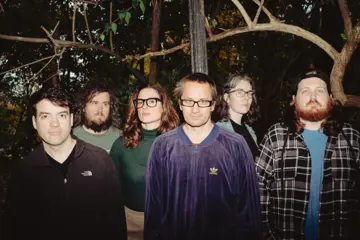I love commercial radio—the headspace of serving what people want when they want it. If people wish to Taylor Swift, I’m here for it. It’s such an important part of the music landscape, not because it helps break artists, but because it connects the 60% of humans that don’t have the bandwidth to care about who Spacey Jane are with the joy of listening to music. And it’s the gateway to capturing the minds of people who might WANT to learn who Spacey Jane are.
Talk to anyone working in commercial radio, and they’ll tell you… you can try to push new music on people all you want, but at the end of the day, people want what they want. Their job is to play the songs that will give them the largest possible audience so they can sell the ads in between for the highest possible amount. It’s a commercial business. It’s often a brutal business- just ask the multiple breakfast announcers in regional areas (including Melbourne) registering with Centrelink this month. Nobody understands commercial realities like commercial radio.
This is why the submission and subsequent media response from Commercial Radio and Audio’s Ford Ennals around Senator David Pocock’s bill to abolish the 1% cap on what radio pays for the use of music is a real head-scratcher. It shirks commercial principles for a twisted version of protectionism, which seems to both obscure and miss the point at the same time.
For years, the secret weapon CRA had was Joan Warner. For a good decade or two, she spearheaded CRA’s brutal front line against any movement to help Australian music at the expense of radio’s interests. She did a bloody good job arguing for radio, even if she was the thorn in the side of the music industry. Since leaving CRA, she has subsequently gone on the record, admitting that the PPCA cap is indeed unfair and should be scrapped.
Don't miss a beat with our FREE daily newsletter
With a long history in the UK, Warner’s successor, Ford Ennals, is proving just as ferocious a competitor, but where Warner approached combat with a level-headed, fact-based approach, Ennals seems to think that politicians are stupid and that commercial radio does not need a reasonable relationship with the industry that provides the majority of the airtime makeup on the stations he represents.
The damage that the tone of his argument is causing both the music industry AND those within the radio industry that have to work with music companies on a daily basis is quite marked. When this parliamentary stoush is over, music and radio will need to necessarily come together once more, and the ‘toys-out-of-the-cot’ approach of Ennals’ often hysterical submission to the parliamentary enquiry is a jaw-dropping approach to stakeholder engagement.
The submission spends most of its time questioning the record industry's business model and creates straw-man fights against commercial radio having to support Australian music. Bringing an unpopular fight about quotas that wasn’t being had into a debate around royalty caps is strange and counterproductive. If you’re trying to curry favour with elected officials, is arguing that Australian music is sub-par and you shouldn’t need to play it REALLY going to have the desired effect?
The sad thing is that a more measured approach looking at facts could have given the commercial radio industry something to rally behind, pointing out the good work that they do on providing Australian artists airtime. Instead, many of the arguments put to the parliamentary enquiry amount to barbs at the music industry akin to “I heard at the pub that artists get screwed”. Rather than being a considered and researched commercial argument, Ennals has resorted to finger-pointing in a way that will surely hurt rather than help the CRA argument.
Let’s look at the arguments in the CRA submission.
Firstly, the submission celebrates that Commercial Radio is a successful, billion-dollar industry, but within a few paragraphs, we’re already into rewriting history, trying to tie the 1% cap in fees for music to the introduction of copyright quotas and arguing that radio needs commercial protection. Here is CRA’s key tactical mistake in fighting this battle. They want to chain the 1% cap to their support of Australian music. It’s a dangerous game and will backfire not only politically but also in the long-term interests of both radio and music.
The fact is that quotas for Australian music have been around since 1942, while the 1% cap was introduced in 1968. The cap is not there to compensate for playing Australian music. It was there to support an at-the-time fledgeling commercial radio industry to reduce their costs while establishing themselves against the rising threat of television.
Half a decade on, commercial radio is doing pretty well. In 2017, commercial radio was gifted the abolishment of government licence fees, which were heralded as a “94% cut in the total fees commercial radio stations pay to government”.
Not a bad windfall for a billion-dollar industry and if there’s ever a quid pro quo for supporting Australian culture via weak quotas, perhaps that’s it? Right now, Southern Cross Austereo is under a $330 million takeover bid by rival Australian Radio Network. There’s definitely SOME gold in those hills. Or at least someone thinks so.
Not CRA, though, who argue in their submission that commercial radio is in a long-term downturn with a 16% drop in revenue since 2019. In a press release four months ago, Ennals was more upbeat however, telling the market that terrestrial revenue was flat and that digital radio revenue (which was not included in the ‘flat’ figure) was growing very strongly. The Sydney and Melbourne markets were still in growth. So perhaps the woes of commercial radio are a little overstated in the submission?
Need any more proof? Last week, Kyle and Jackie O signed a ten-year $20 million deal with ARN. Not bad for an industry in a supposed downturn. At $2 million a year, one station’s breakfast team (okay, two stations now) is receiving half as much each year as all Australian music rightsholders combined (PPCA receives around $4 million per year from commercial radio).
The second bait-and-switch in Commercial Radio Australia’s submission comes from continually using the figure of $40 million in copyright fees by conflating fees paid to APRA and other collection agencies together with PPCA.
They clearly hope nobody will notice because copyright CAN get complicated, but in a nutshell, the APRA fees are paying the songwriter, while the PPCA fee pays for the sound recording. This is akin to arguing that you shouldn’t need to pay producers and tech staff at a radio station because you’re already paying the announcers so much. Some unkind radio industry commentators might argue that already happens.
Why don’t they mention the $4 million? Because it actually highlights how ridiculous the situation is. Every time You’re The Voice gets aired on Australian radio, the UK writers of the song get nearly four times more money than John Farnham. That’s why it’s more convenient to add the numbers together so that this inconvenient truth can be buried.
In the next argument, CRA tries to play detective and solve a completely different problem to the one currently before the parliament. This time, they want to champion Australian artists (the ones they don’t want to support by abolishing quotas), suggesting that the best way to get more money for artists is to reform the business models of the evil record labels.
In what is one of the most incredibly interventionist arguments we’ve seen, the radio industry argues not only that there should be a cap on what music rights holders can charge but also that their poor business models are the justification for why that punitive measure should remain.
Artists choose to enter into agreements with their labels at the terms they choose to sign. Here in Australia, a huge portion of the songs now on commercial radio are on labels other than the three majors, with artists choosing to go completely indie, licence their tracks to independent distributors or labels, or, in some cases, do joint ventures. There’s never been a time in history when artists have more choice in who they work with and under what terms.
Frankly, none of that is the business of commercial radio. In their submission, CRA says that “it appears” that artists receive less than 10% of the money collected by record companies. This figure is referenced again and again and is completely unsourced.
The submission also references a piece in The Conversation about how session musicians do not receive trailing royalties. A very interesting piece, but also completely unrelated to the issue at hand, and you could be forgiven for thinking that it makes it look like the 10% figure is actually referenced when it is not.
It’s schoolyard “he said, she said” stuff that, thankfully, the music industry hasn’t participated in. Why isn’t the music industry retorting with how the radio industry pays their regional announcers next to nothing and exploits the dreams of wannabe radio announcers? Why don’t they shine a light on the fact that there are no royalties on income generated by podcasts by the talent on them? How about they talk about how most announcers get no cut of what their talent gets from viral content? Or where’s their mandatory cut of ads broadcast when they are on-air? The simple answer is it’s none of music’s business.
The music industry doesn’t play that game, because it’s stupid. Telling a sophisticated industry like radio how they should remunerate their talent or how their business should work would be ridiculous. Just as it is in this instance where CRA think they know how to run a record company. It’s resulted in fewer headlines in their favour, but PPCA taking the high road on this and sticking to the facts at hand will be noted and appreciated by the parliamentary enquiry, where it really matters for their members.
CRA also seem very keen to highlight PPCA’s administration fee, which it claims to be running at around 16%. Apart from the fact that it’s completely irrelevant to the topic at hand, looking at other copyright collection agencies, it doesn’t seem prohibitive.
APRA AMCOS is currently 13.8%, ASCAP is 11.3% (in a far larger US territory), and BMI (also in the US) is 15%. The irony here in CRA’s argument is that there are two ways to reduce the overhead percentage of a copyright agency. One is to cut staff and activities. The other is to increase revenue. If PPCA’s bid is successful and more money can be raised from commercial radio, then the percentage spent on administration may well come down as a result. I’m sure CRA will be cheering for the artists when that happens.
The most pathetic argument, however, is that the holding back of money from the Australian recording industry via the 1% cap is in some way compensation for the arduous burden of having to play Australian music.
The reality is that commercial radio already finds every possible loophole to play the songs they want to play. Rules or no rules, some stations are playing as little as one Australian song an hour or less in peak times. Is that one song hurting them, or is there enough great Australian music to hold that space? Like a toddler being told they can’t choose their own bedtime, of course, the radio industry would prefer to play things they want to play whenever they want to, but it’s not a rule put in there for the record companies; it’s a rule put in there for Australia.
Whether a UK, Canadian or Australian song is being played is of no consequence to a multinational label. Cash is cash to a label like Universal, Sony or Warner, whether it’s being generated from an Australian artist or an overseas one. Quotas are not about making more money for multinationals; they are about giving Australian artists a chance to be heard over the international noise.
If radio is given Australian airwaves to broadcast on, they should be part of the cultural conversation, and thankfully, the commercial radio industry has people that do like and care for Australian content.
If a banging Australian song is released, why WOULDN’T radio want to play it? The fact is they do. The sad part of this whole sorry situation is that now more than ever, the radio and music industries should be working together for the greater cultural goal of supporting Australian artists. It’s good for radio too. There’s hardly a person I know in commercial radio who wouldn’t argue that lifting the quality of Australian music and lifting their listeners’ access to it isn’t a good aspiration.
The conversations that need to be had around how Australian music can thrive more need commercial radio minds around the table. There are amazing music directors, content directors and consultants out there who understand the issues. They understand that radio needs to bend but also that labels need to change the way they engage. There’s a lot to learn from each other.
I feel sorry for those in radio for whom it seemed music was coming together to have important and frank discussions about Australian music. They are now stuck behind a front-line war, where the music they play is being used as cannon fodder in a fight between two corporate entities, none of which represent the opinions of those at the coalface on both sides who just want to see a better deal for Australian artists.
Record companies need to take a good hard look at themselves, too. If they want proper dialogue with radio stations, the reality is they probably should be engaging more commercially. Thankfully, the old days of throwing stones from the sidelines that radio should support their artists more because they have a moral obligation has given way to more nuanced and useful conversations. As the folly of relying solely on viral video campaigns that don’t go viral or digital campaigns that don’t convert new listeners are slowly being realised by record companies, the irony is that improved commercial engagement with commercial radio should be back on the table.
But none of that is of any consequence to the argument that mid-20th-century protectionism has no place in modern Australia. Commercial Radio is able to sell its product at whatever the market deems a reasonable rate, and music rights holders should be able to do the same. If it’s okay for songwriters, why not for performers?
The reality is that the “chicken little” bullshit from CRA is completely transparent. The removal of the 1% cap will simply mean that the ability will be there for PPCA and CRA to negotiate the amount that rights holders should be compensated in good faith. CRA’s wild claims that PPCA wants to increase fees by “up to 900%” are ridiculous and not based in fact. If no deal can be arranged (and let’s face it, it probably won’t be), it will be sent to the copyright tribunal, where a fair rate will be set after hearing both sides. There is no doubt that the rate will be lower than the PPCA would like and higher than the CRA would like.
Let’s hope this toxic debate can be ended quickly so as necessary bedfellows, both industries can go back to what is really needed: Working together to find and nurture great Australian music, not for the sake of the labels or the radio stations, but for the sake of the listeners.















